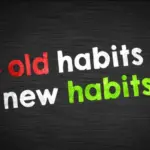
We are all accustomed and it is generally difficult for us to find new ways of acting. But change is life, and life is a continuous flow of both evolutions and transitions. It is a natural fact and as such it is advisable to accept it and live it in the most constructive way possible. However, not everyone succeeds: as human beings, we are basically, more than less, animals of habit and, therefore, everything that disturbs balances, habits, mental schemes, consolidated behaviors, generates subtle anxiety. In this PsychologyFor article we will see together What is resistance to change and how to overcome it. We will learn about the types of resistance to change, the causes and factors of resistance to change and how to overcome resistance to change.
What is resistance to change with examples
What is resistance to individual change? Resistance to change is a phenomenon known in psychology: Human beings tend to be conservative and reject innovations, even those that in the long run they consider very positive in themselves, unless they are forced to accept them. It can be defined as that emotional/behavioral reaction to real or imagined events that threaten the status quo.
The decision-maker’s resistance to change can be explained by the need for certainty and coherence; In fact, an uncertain situation is much more preferable, even if it is considered advantageous. Many experimental investigations demonstrate the human propensity for reactivation due to uncertainty, incoherence.
Resistance to change is often directed at those in power, who have not properly consulted those lower down. It is also the anxiety about changing habits and norms. Finally, it is due to the risk of losing prestige in the event of failure and lower performance. Not knowing whether he will be able to confirm the standards of functioning, the person experiences fear and the risk of devaluation both in front of others and with respect to the image of himself.
Causes of resistance to change
First law of change: all change implies learning and all learning implies change. From this axiom we derive the fact that the origin of “resistance” to change in some people, even before the psychological-characteristic factor, is of a neurophysiological nature, since each new connection created by the brain implies a true “neural fatigue.” ” with its consumption of oxygen and sugars.
In other words, Any change has its cost in energy use. These costs are easily borne by those who have abundant energy resources, such as children or particularly active and creative adults. People who, on the other hand, have lost or have not sufficiently developed the necessary mental elasticity, becoming very “structured” and accustomed over time, experience the “costs” of the changes as true. stress that generates fatigue frustration and in many cases also strong hostility.
Of course, each person “structures” his or her approach to changes not only based on brain plasticity, but also and above all based on life experiences and the results of success or failure obtained over time to make facing different situations.
Types of resistance to change
Many types of resistance are stereotypes and can be anticipated. Below are seven possible reasons for resistance to change:
- homeostasis. It is the natural tendency to seek balance in interpersonal relationships.
- Habits. Repetitive behaviors give rise to automatic behaviors.
- Generalization. “The work has been going like this from the beginning and therefore why should it not continue now?”
- Selectivity. Only information that confirms current behavior is perceived; selective perception.
- Addiction. It is the feeling that current routine behavior is essential to maintain the achieved position.
- Normalization of everyday life. The mind detects unusual behaviors and causes feelings of rejection when these behaviors are at odds with its system of norms and values.
- Security. Change can give rise to a feeling of insecurity, which is rejected.
How to overcome resistance to change
How to reduce resistance to change? To avoid resistance to individual change and manage resistance to organizational change, the following tips can be applied.
- Identify your usual behavior patterns.
- Identify those things that could be improved and what ways there are to improve them.
- Clearly state your objectives.
- Make well-defined decisions.
- Try new strategies and new methods. Assume the philosophy that every failure is a learning experience.
- React non-defensively when others disagree with you.
- Stay calm when talking to those around you.
- Be open, sincere and assertive when dealing with others.
- Develop creative and innovative solutions to problems.
- Celebrate every small victory.
- Defeat inertia.
- Reflect and act, don’t stay reflecting forever. There are never perfect conditions, at some point you have to start.
- Practice leaving your comfort zone.
- Make change an integral part of your life: the more changes you make, the more flexibility you will gain.
- Actively participate in the change process.
This article is merely informative, at PsychologyFor we do not have the power to make a diagnosis or recommend a treatment. We invite you to go to a psychologist to treat your particular case.
If you want to read more articles similar to What is resistance to change and how to overcome it we recommend that you enter our Personal Growth and Self-Help category.
Bibliography
- De Sario, P. (2012). Il potere della negativà. Group, work, relationships: the method to transform conflicts and problems and enhance organizational benefits. Milan: Franco Angeli.
- Greco, S. (2007). The psychology of change. Rifles, laughs and strategies to govern life events. Milan: Franco Angeli.
- Kreitner, R., Kinicki, A. (2004). Organizational Behavior. New York: McGraw-Hill.
- Mariotti, G. (1999). Tempi d’attesa e priority in sanità. The selection of information as a strategy for quality. Milan: Franco Angeli.








